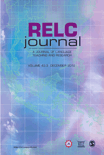
RELC Journal
metrics 2024
Elevating Academic Discourse in Language Studies
Introduction
RELC Journal, published by SAGE Publications Ltd, stands as a leading platform in the fields of Education and Linguistics, boasting an impressive Q1 ranking in both categories according to the latest metrics. Established in 1970 and continuing its commitment to academic excellence through 2024, the journal features rigorous peer-reviewed research that explores the intersections of language, culture, and pedagogy. With a notable Scopus ranking that places it in the 98th percentile for both Language and Linguistics (Rank #16/1088) and Education (Rank #91/1543), the RELC Journal is essential for scholars, educators, and practitioners seeking to contribute to and stay abreast of cutting-edge developments in their respective fields. Although currently not open access, the journal remains accessible to a diverse audience and invites contributions that challenge conventional perspectives and inspire innovative practices in language education.
Metrics 2024
 1.33
1.33 3.60
3.60 3.30
3.30 47
47Metrics History
Rank 2024
Scopus
IF (Web Of Science)
JCI (Web Of Science)
Quartile History
Similar Journals

Journal of Asia TEFL
Bridging Cultures Through Language EducationWelcome to the Journal of Asia TEFL, a leading peer-reviewed platform dedicated to exploring the intersections of English language education, linguistics, and the dynamic educational landscapes of Asian contexts. Published by ASIA TEFL in South Korea, this journal has emerged as a pivotal resource for academia since its inception in 2004, with consistently expanding influence reflected in its Scopus rankings, including a notable 76th percentile in Linguistics and Language. With a focus on the evolving methodologies and pedagogical innovations in English language teaching, the journal aims to foster scholarly discussions that enhance teaching practices and policy-making in a globalized world. Although it currently operates without open access, its rigor and relevance in categories such as Education and Linguistics ensure that it remains a valuable asset for researchers, educators, and students seeking to advance their knowledge and practice within this vital field of study.
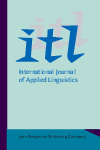
ITL-International Journal of Applied Linguistics
Innovating the future of language studies through rigorous scholarship.ITL-International Journal of Applied Linguistics, published by JOHN BENJAMINS PUBLISHING CO in Belgium, stands as a leading journal in the field of applied linguistics and education, recognized for its rigorous scholarship and impactful contributions. With an impressive ranking of Q1 in both the Education and Linguistics and Language categories, ITL holds its place among the top journals globally, featuring in the Scopus rankings with a notable 91st percentile in both Arts and Humanities as well as Social Sciences. The journal aims to disseminate innovative research exploring the intersection of linguistics, language acquisition, and pedagogical practices, fostering a rich academic dialogue among researchers, educators, and practitioners. Though not currently an open access journal, ITL remains accessible to a broad readership, with an emphasis on high-quality, peer-reviewed articles that inform and inspire advancements in applied linguistics. The journal's commitment to academic excellence and relevance makes it an essential resource for those seeking to understand and contribute to the dynamic landscape of language studies.
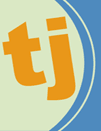
TESOL Journal
Advancing the Art of Language EducationTESOL Journal, published by Wiley, is a premier academic journal dedicated to advancing the field of Teaching English to Speakers of Other Languages (TESOL). With an esteemed reputation reflected in its high impact factor and its Q1 ranking in both Education and Linguistics and Language categories for 2023, this journal serves as a critical resource for researchers, educators, and policy-makers. It covers a wide spectrum of topics related to language acquisition, pedagogical innovations, and educational strategies in TESOL, contributing significantly to the discourse around multilingualism and effective teaching practices. The journal is notable not only for its rigorous peer-review process but also for its commitment to disseminating high-quality research that informs and inspires practice in diverse educational settings. Interested readers can access articles through traditional subscription methods, ensuring that groundbreaking research is available to a broad audience. With converged years spanning from 2010 to 2024, TESOL Journal continues to evolve, making it a vital publication for anyone interested in the complexities of language education.
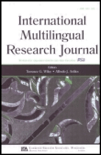
International Multilingual Research Journal
Fostering innovative dialogue in education and linguistics.The International Multilingual Research Journal, published by Routledge Journals, Taylor & Francis Ltd, is a leading platform for the dissemination of innovative research in the fields of Education and Linguistics. With an impact factor reflecting its rigorous academic standards and a Q1 ranking in both relevant categories, this journal is dedicated to advancing the understanding of multilingualism and its implications globally. It serves as an essential resource for researchers, educators, and practitioners who seek to explore the complexities of language and learning across diverse cultural contexts. Since its inception in 2010, the journal has converged a wealth of scholarly articles that address contemporary issues in language use and pedagogical practices. The journal adheres to the highest research integrity standards and promotes open dialogue among scholars, making it a vital tool for those engaged in this expanding field. With its strong positioning in prestigious databases like Scopus, the International Multilingual Research Journal is committed to enriching the academic community and fostering interdisciplinary collaborations.
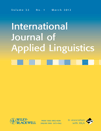
International Journal of Applied Linguistics
Pioneering Research for Language Educators and PractitionersInternational Journal of Applied Linguistics, published by WILEY, is a premier platform for cutting-edge research in the field of applied linguistics. With a notable Impact Factor and ranked in the top Q1 quartile of linguistics and language, this journal serves as an essential resource for scholars, practitioners, and students. The journal’s wide-ranging scope includes various subfields such as language acquisition, language education, sociolinguistics, and discourse analysis, fostering multidisciplinary approaches to language studies. It has achieved a significant Scopus Rank, placing it in the 90th percentile for both Arts and Humanities as well as Social Sciences categories, reflecting its high visibility and influence in the academic community. The International Journal of Applied Linguistics is committed to advancing the understanding of language use in real-world contexts through rigorously peer-reviewed articles that contribute to both theory and practical applications. While it is not an open-access journal, it remains a highly respected publication for researchers looking to disseminate and acquire knowledge in applied linguistics.
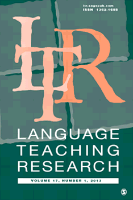
Language Teaching Research
Unveiling the complexities of language acquisition.Language Teaching Research, published by SAGE Publications Ltd, serves as a pivotal platform for scholars and practitioners in the domains of education and linguistics. Since its inception in 1997, this prestigious journal has maintained its status within the Q1 category for both Education and Linguistics, symbolizing its significant impact and commitment to excellence in research. With impressive Scopus rankings placing it among the top percentile in its fields, Language Teaching Research provides a comprehensive array of articles, studies, and reviews dedicated to advancing the theory and practice of language education. Although currently not an Open Access journal, it remains essential reading for those engaged in the evolving challenges and methodologies surrounding language teaching and learning. The journal aims to foster insightful discussions and disseminate innovative research findings, making it a crucial resource for educators, researchers, and students keen on enhancing language acquisition and pedagogical strategies.
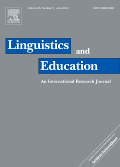
Linguistics and Education
Exploring the Nexus of Language and LearningLinguistics and Education, published by Elsevier, is a premier journal dedicated to advancing the understanding of the intersections between linguistics and educational practices. With its ISSN 0898-5898 and E-ISSN 1873-1864, this journal has established itself as a significant platform since its inception in 1988, continuing to produce impactful research up to 2024. It enjoys a prestigious Q1 ranking in both the Education and Linguistics and Language categories, reflecting its high-quality contributions and leading role in the field. The journal’s Scopus rankings further underscore its influence, being placed in the 87th percentile for Arts and Humanities in Language and Linguistics, and the 86th percentile in Social Sciences in Linguistics and Language. Although it operates under traditional subscription access, its contributions are essential for researchers, professionals, and students alike, making substantial strides in the understanding of language, learning environments, and pedagogical strategies. The journal's objective is to foster interdisciplinary dialogue and disseminate innovative research that informs educational policy and practice.
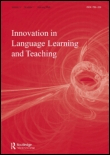
Innovation in Language Learning and Teaching
Inspiring Educators to Innovate and Transform Language Learning.Innovation in Language Learning and Teaching is a premier peer-reviewed journal published by Routledge Journals, Taylor & Francis Ltd, focusing on the intersection of innovative practices in language education and teaching methodologies. With a notable impact factor reflected in its recent placement in the Q1 quartile for both Education and Linguistics and Language categories, this journal serves as a crucial resource for scholars and practitioners aiming to enhance pedagogical approaches and improve learning outcomes in language education. Spanning from 2009 to 2024, it showcases cutting-edge research that addresses contemporary challenges in the field, facilitating a deeper understanding of language acquisition, pedagogy, and curriculum development. The journal is indexed in Scopus, demonstrating its significant contribution to the academic community, with impressive ranks in both the Arts and Humanities as well as the Social Sciences categories. Although it follows a traditional subscription model, the journal is committed to disseminating high-quality research that fosters collaboration and discussion among researchers, educators, and students dedicated to advancing language learning and teaching practices.
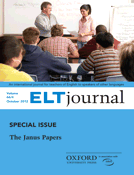
ELT Journal
Exploring Innovations in English Language TeachingELT Journal, published by Oxford University Press, is a premier academic journal dedicated to the fields of Educational Psychology, Linguistics, and Language, boasting an esteemed Q1 category ranking across these disciplines. Since its inception in 1946, the journal has served as a vital platform for researchers and educators, offering insights into English Language Teaching (ELT) and the evolving pedagogical practices that influence language acquisition and literacy development. With an impressive Scopus ranking placing it in the 95th percentile within the Arts and Humanities (Linguistics and Language), ELT Journal not only contributes to academic discourse but also bridges theoretical frameworks with practical applications in educational settings. Although it does not currently offer Open Access, the journal remains essential for professionals and students alike, eager to stay abreast of the latest research trends and innovations in the global ELT landscape. For those committed to advancing their understanding of language education, the journal's diverse range of articles and case studies provide invaluable resources.

Journal of Teaching English for Specific and Academic Purposes
Navigating the Future of English for Specific Purposes.Journal of Teaching English for Specific and Academic Purposes, published by UNIV NIS, FAC SCI MATH, is a pivotal platform for researchers, educators, and practitioners in the field of language education, particularly focusing on specialized and academic English instruction. With an ISSN of 2334-9182 and an E-ISSN of 2334-9212, this journal serves as a conduit for innovative research and pedagogical advancements from 2019 to 2024, contributing significantly to the understanding of language teaching methodologies. As a recognized entity in the Q3 category of Education as per 2023 evaluations, it ranks #1071 in Scopus’s social sciences education realm, indicating its growing influence and relevance. Although it operates without open access, the journal aims to provide a comprehensive exploration of effective teaching strategies and academic practices, crucial for both current scholars and institutions. The journal welcomes diverse contributions that shed light on the evolving landscape of English language teaching, making it an essential resource for those striving to enhance their knowledge and practice in this important area.